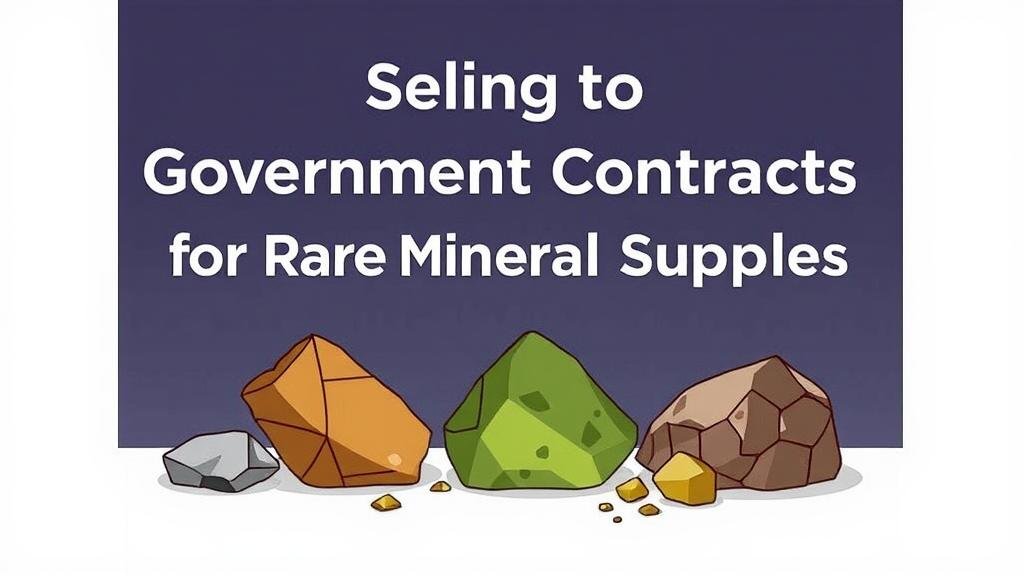Selling to Government Contracts for Rare Mineral Supplies
Selling to Government Contracts for Rare Mineral Supplies
Understanding the intricacies of government contracts for rare mineral supplies can be a lucrative yet complex endeavor. Rare minerals, such as lithium, cobalt, and rare earth elements, are critical to various industries including electronics, renewable energy, and defense. This article aims to provide a comprehensive guide for businesses looking to sell to government entities, detailing the process, requirements, and best practices.
The Importance of Rare Minerals
Rare minerals play an essential role in technological advancement and national security. For example, lithium is a key component in batteries for electric vehicles, and cobalt is indispensable for durable battery solutions. A report by the U.S. Geological Survey indicates that the demand for rare earth elements is projected to rise as industries pivot towards sustainable practices, increasing the significance of stable supply sources.
Understanding Government Contracting
Government contracting is a way for federal, state, and local governments to procure goods and services. process is regulated by the Federal Acquisition Regulation (FAR), which governs how government contracts are formed, executed, and managed.
Types of Government Contracts
When it comes to rare minerals, various types of contracts may be applicable, including:
- Fixed-Price Contracts: These contracts set a specific price, which remains unchanged regardless of the projects cost.
- Cost-Reimbursement Contracts: These contracts reimburse the contractor for their costs, plus an additional fee or fixed fee.
- Indefinite Delivery/Indefinite Quantity (IDIQ) Contracts: These provide an indefinite quantity of supplies or services during a fixed period.
Preparing for Government Contracts
Preparation is crucial for businesses seeking to sell to government entities. There are several steps to consider:
1. Certification and Registration
Businesses must register with the System for Award Management (SAM) to be eligible for government contracts. This registration provides a unique identifier and ensures compliance with federal regulations.
2. Understanding Solicitations
Solicitations are requests for proposals (RFPs) issued by government agencies. Understanding how to interpret these requests is vital. For example, an RFP may specify the types of minerals required, purity levels, and delivery timelines.
3. Building Relationships
Networking with government officials and industry peers can help to establish relationships that facilitate contract opportunities. Attending industry conferences and events is a practical approach to build connections in this sector.
Challenges in Selling Rare Minerals to Government
While there are opportunities, businesses may encounter several challenges in the government contracting space:
- Compliance with Regulations: The regulatory environment is complex, with strict adherence required to environmental and safety standards.
- Long Sales Cycles: Federal procurement processes are often lengthy, requiring patience and strategic planning.
- Competitive Bidding: The government often places contracts in a competitive bidding format, necessitating a compelling proposal to stand out.
Real-World Applications and Case Studies
Several companies have successfully navigated the complexities of selling rare minerals to government entities. For example:
- Livent Corporation: This lithium producer has successfully entered contracts with the U.S. government by supplying lithium hydroxide for battery production, contributing to national interests in clean energy technology.
- MP Materials: As a leading supplier of rare earth materials, MP Materials has secured contracts with defense agencies to supply crucial elements for military applications, showcasing the importance of rare minerals in national security.
Actionable Takeaways
For businesses looking to enter the government contracting field for rare mineral supplies, consider the following:
- Ensure compliance with SAM registration and federal regulations.
- Invest time in understanding solicitations and tailoring proposals effectively.
- Build strategic partnerships and networks to enhance contract opportunities.
- Prepare for the challenges inherent in long sales cycles and competitive bidding processes.
In summary, selling rare mineral supplies to government entities can be a complex yet rewarding venture. Through diligent preparation, compliance, and strategic networking, businesses can position themselves to succeed in this essential industry.



